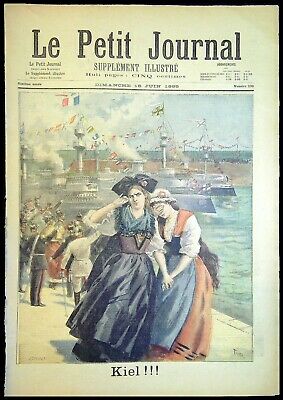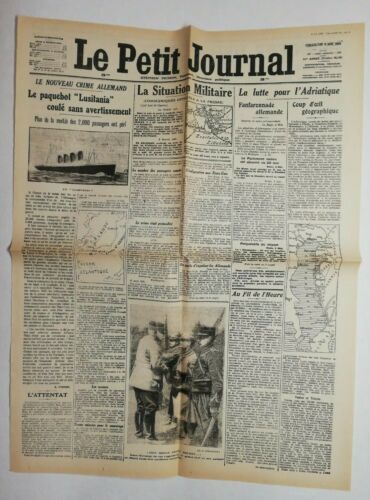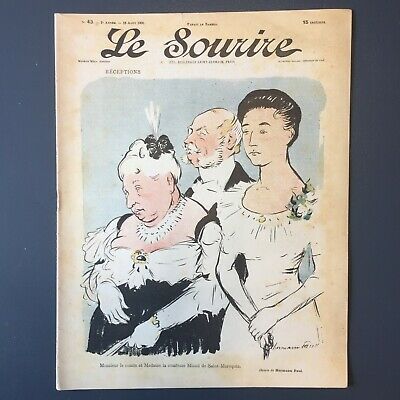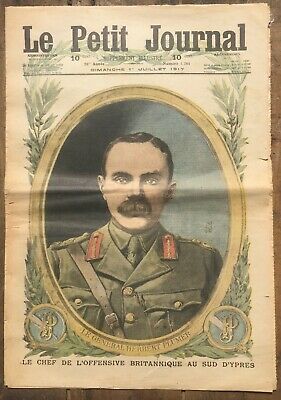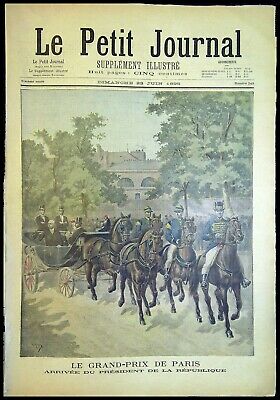-40%
The Small Journal N°239 of / 1895 - Kiel With Jeddah Assassination Consuls
$ 9.11
- Description
- Size Guide
Description
Le Petit Journal N ° 239 - 1895-
Engravings
1)
KIEL !!!,
2)
In Jeddah assassination of European consuls
-
History of the Petit Journal
The small newspaper,
is a republican and conservative Parisian daily newspaper, founded by Moïse Pollydore Millaud, which appeared from 1863 to 1944.
It is at the ankle between the nineteenth and twentieth centuries and until the
First
World War One, one of the four largest French dailies, along with Le Petit Parisien, Le Matin, and Le Journal.
He produced a million copies in 1890, in the midst of the Boulangist crisis.
Collaborated with the Petit Journal / Albert Londres, René Hachette, Raymond Patenôtre, Saint-Paulien Victor , Daniel-Rops, Roger Vercel, Stephen Pichon and Maxence Van der Meersch.
The founder of the title and Moïse Millaud, from a Jewish family in Bordeaux, he started in business and press affairs from the July monarchy with financial or judicial publications. In 1856, he bought the Girardin Press, but its failure made him understand that this formula, new twenty years earlier, was now outdated.
He entrusted its management management to his nephew Alphonse (born June 11, 1829 in
Mouriès
), son of his brother Joseph.
The
Small Journal
attracts many readers because the transition from printing "to the sheet" to printing in
rotary
allows it to be cheap: it costs only 5 cents instead of 15 cents for ordinary newspapers. It has a convenient format (43 × 30 cm), smaller than its competitors hence its name, is accessible to all (no subscription), and offers, alongside national and international news, entertaining content including
miscellaneous
,
soap operas
,
horoscopes
and
chronicles
. Journal declaring itself apolitical - even if this is not quite the case -, it is exempt from
stamped
. It is also a
evening newspaper
, sold by town criers at the exit of factories and workshops. It is the emblem of a new form of journalism which is developing, that of the
small press
.
The small newspaper
in fact sees his sales increase considerably when he begins to publish the report of extraordinary news items, such as the
Troppmann case
, in September 1869. All of Paris is rushing to
Puppet
, where we have just discovered seven corpses belonging to the same family. Around the pit, we set up a fun fair. Faced with the emotion aroused by this slaughter,
Alphonse Millaud
, boss of
Small Journal
, decides to cover the story extensively. Immediately, the entire country fell in love with this odiously slaughtered family. Police arrest a certain
Jean-Baptiste Troppmann
, while trying to embark for the Americas. He has the papers and jewels of the unfortunate family with him. For Millaud, the Troppmann affair turned out to be a gold mine: the newspaper's circulation thus increased from 200,000 copies per day to 300,000, then to 500,000! This exploitation of the various facts then becomes the editorial strategy of the newspaper, on which many historians will pass a severe judgment,
After 1900, the prints began to stagnate and then to decrease:
The Little Parisian
, better managed and which avoids taking sides in
the Dreyfus affair
, becomes the largest French newspaper.
Ernest Judet
(1851-1943) place
The small newspaper
in the anti-Dreyfusard party and rallies it to the nationalist cause. In 1914
The small newspaper
only produced 850,000 copies, and its circulation fell to 400,000 in 1919. After the war, a good part of its readers, disconcerted or shocked by the newspaper's commitment to the anti-Dreyfusard party, then passed to the reading of a competitor who crossed the bar of two million copies and became the king of the small press:
The Little Parisian
.
Despite the successive sponsorships of
Loucheur
, then
Patenôtre
, the decline was accentuated between the wars. In 1937, it was only printing 150,000 copies, when on July 14 it became the organ of the
French Social Party
(PSF) of
colonel de La Rocque
, but his hearing was not improved. The motto of the PSF, "
Work, Family, Fatherland
», Borrowed from
Cross of Fire
and subsequently resumed, in 1940, by the
French State
, therefore appears on the daily banner, to the left of the title. La Rocque was director of the newspaper and chairman of its board in April 1938
7
, until his arrest in Mars 1943.
Folded to
Clermont-Ferrand
in June 1940, the
Small Journal
lived there, poorly, until August 1944 when he disappeared completely; during this period he received a monthly grant from
Vichy government
; its board of directors was then chaired by Colonel de La Rocque. Academicians collaborate on it until the last issue:
Louis Madelin
,
Jerome Tharaud
and his brother,
Gabriel Hanotaux
,
Henry Bordeaux
,
Augustus of the Force
. As well as writers like
Henri pourrat
,
Roger vercel
,
Daniel-Rops
.
The newspaper and the vice-president of its board of directors, André Portier
(the president, La Rocque, having died in 1946), are tried in 1948 by the
court
of the
Seine
, for having continued to appear under the Occupation and under the accusation of intelligence with the enemy. The lawyers argued that
La Rocque provided intelligence to the Intelligence Service, which led to him being deported. The court issued a judgment of acquittal.
Le Petit Journal N ° 239 - 1895 - Engravings 1) KIEL !!!, 2) In Jeddah assassination of European consuls - History of the Petit Journal The small newspaper, is a republican and conservative Parisian daily newspaper, founded by Moïse Pollydore Millaud, which appeared from 1863 to 1944. It is at the ankle between the nineteenth and twentieth centuries and until the First World War One, one of the four largest French dailies, along with Le Petit Parisien, Le Matin, and Le Journal. He produced a million copies in 1890, in the midst of the Boulangist crisis. Collaborated with the Petit Journal / Albert Londres, René Hachette, Raymond Patenôtre, Saint-Paulien Victor , Daniel-Rops, Roger Vercel, Stephen Pichon and Maxence Van der Meersch. He entrusted its management management to his nephew A
